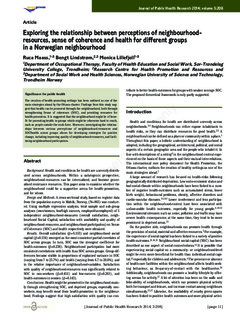Exploring the relationship between perceptions of neighbourhood-resources, sense of coherence and health for different groups in a Norwegian neighbourhood
Journal article, Peer reviewed
Published version

Åpne
Permanent lenke
http://hdl.handle.net/11250/2626275Utgivelsesdato
2014Metadata
Vis full innførselSamlinger
Sammendrag
Background. Health and conditions for health are unevenly distributed across neighbourhoods. Within a salutogenic perspective, neighbourhood-resources can be internalised, and become generalised resistance resources. This paper aims to examine whether the neighbourhood could be a supportive arena for health-promotion, and for whom.
Design and Methods. A cross-sectional study, based on register data from the population-survey in Malvik, Norway, (N=865) was conducted. Using multiple regression analysis, total sample and sub-group analyses (men/women, low/high earners, employed/unemployed) of 5 independent neighbourhood-measures (overall satisfaction, neighbourhood Social Capital, satisfaction with availability and quality of neighbourhood-resources, and neighbourhood participation) on Sense of Coherence (SOC) and health respectively were obtained.
Results. Overall satisfaction (β=0.153) and neighbourhood social capital (β=0.134) emerged as the most consistent partial correlates of SOC across groups. In turn, SOC was the strongest coefficient for health-outcomes (β=0.238). Neighbourhood participation had more consistent correlations with health than SOC across groups. Group-differences became visible in proportions of explained variance in SOC (varying from 7 to 23.7%) and health (varying from 6.7 to 20.6%), and in the relative importance of neighbourhood-variables. Satisfaction with quality of neighbourhood-resources was significantly related to SOC in non-workers (β=0.451) and low-earners (β=0.261), and health-outcomes in women (β=0.143).
Conclusions. Health might be promoted in the neighbourhood mainly through strengthening SOC, and deprived groups, especially non-workers, may benefit most from health-promotion in the neighbourhood. Findings suggest that high satisfaction with quality can conribute to better health-outcomes for groups with weaker average SOC. The proposed theoretical framework is only partly supported.
